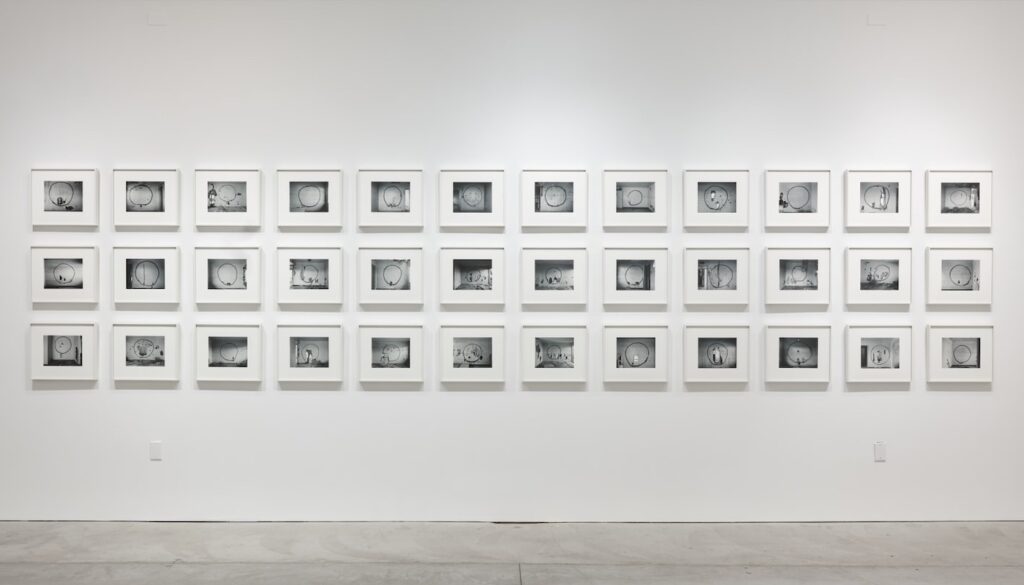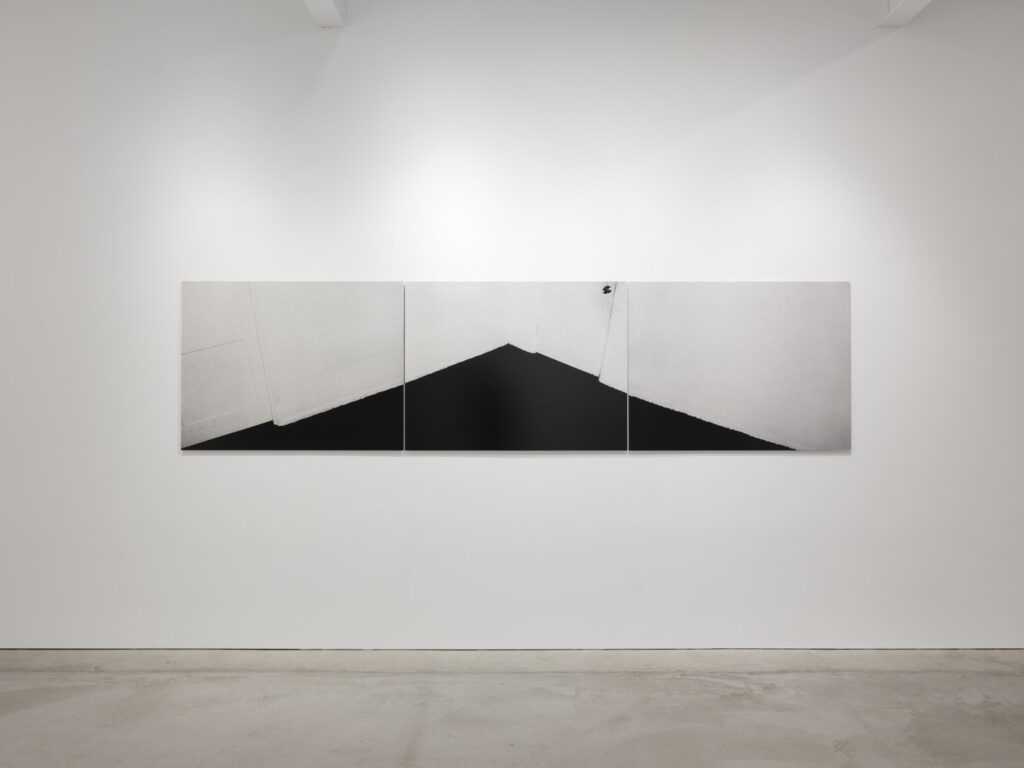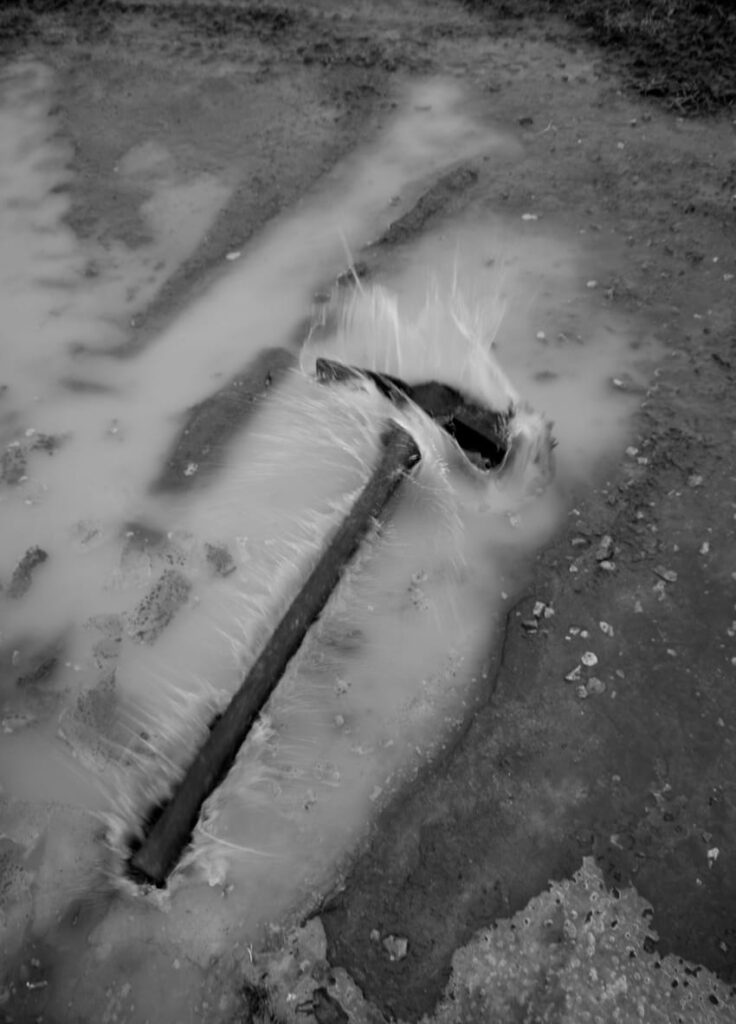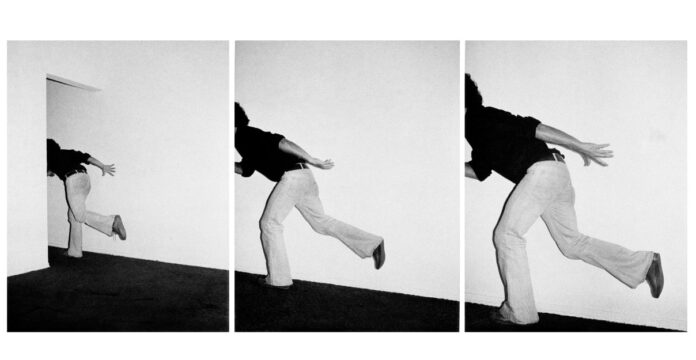A soft confrontation of time and place reverberates through the gallery in “Considered Interactions,” on view at Casemore Kirkeby through May 28. The black-and-white photographic work by John Divola, Tarah Douglas, Steve Kahn, and Raymond Meeks and Adrianna Ault lures the viewer in with their velutinous surfaces and the sleek tactics of photography. Yet, as one spends more time with the work, one’s sense of belonging, memory, and the steady passing of events are accentuated and challenged.
The photographic work in “Considered Interactions” poignantly engages with time scales and the way in which people imbue meaning into their surroundings. These artists document gestures at eccentric locales, teetering on the edge of transition. Dark humor throughout the exhibition points to the frustrating and curious challenge of seeking to capture something that is already in the process of changing. The one with the camera and the subject of the image operate in an inescapable choreography of momentum, implicating both the physical and the memory of place.

In John Divola’s “ENSO: 36 Right-handed Gestures,” constraints guide his practice. In the morning, he drew circles as large as his right hand would allow on the abandoned housing tract walls, formerly the George Air Force Base in Victorville, California. Bold black spray paint encircles the wrinkles of walls, drooping with age. Divola’s bodily inscriptions become part of an archive of marks, one more amidst traces of many gestures by the former inhabitants of this space, both animate and elemental. The 36 photographs hung in a 12×3 grid are understood as one singular work. Time stutters across the grid, where the edge of the picture plane interrupts each day.
Like Divola, there is a quiet cadence to the composition in Tarah Douglas’ “Untitled (no 1-15),” in which Douglas returns to a single place repeatedly. The stark white edge of the frame segments each photograph, notating gaps in time. The 15 shots stretch out horizontally, resembling a musical score. Douglas alternates between attending to an altar and climbing up a steep dune in each photograph. Read successively, Douglas’ pose shifts from encircling a grouping of objects to clutching her head between her knees to kneeling close to the objects to climbing back up the hill, continuing across the series. Rather than focus on the material traces of gestures, it is her physical presence that brings forth her emotive struggle and perseverance.

Steve Kahn’s richly textured photograph “Triptych #3 Mural” is an expansion of his work focusing on the Hollywood Suites in Los Angeles in the 1970s. Working with a Polaroid camera exhibits Kahn’s work as an intuitive process while shooting and meticulous attention in reframing the photograph to this composition. At its large scale, the print reveals the dappled resolution of the original image to signal both the processes and limitations of image-making. Conceptually, “Triptych #3 Mural” evokes a sense of confinement through his use of perspective. The viewer looks down into the vastness of the opaque black floor. This dizzying perspective, coupled with the grainy low resolution of the walls, pushes the viewer into a space of dream-like vertigo, questioning the legitimacy of the image to document some semblance of reality—whatever that might be.

In Raymond Meeks and Adrianna Ault’s series “Winter Auction,” bygone farm equipment takes flight in a ritual documented by Meeks and Ault at their family farm. Moving from left to right, the first 5 photographs have a distant horizon line with the object well above the ground. In the last two prints, the perspective shifts downward. Droplets slip off the pitchfork’s handle, dripping into the water beneath it, creating anticipation. The hoe in the final print splashes into the water, sending phantom-like wisps of water into the air, as if its soul was departing. Swallowed by the accumulation of time, these weathered tools transform into unknown objects. As the knowledge and use-value of their function become obsolete, they sink into the mud.
These photographic works tease out how meaning prescribed to a place is simultaneously fickle, flippant, and sacred. The exhibition examines the desire to document what is already in the process of breaking down–a seemingly futile gesture to manifest a tangible record of an immaterial memory. With a tenor of humor, nihilism, and care, the exhibition exonerates our tendency to veer in circles in the pursuit of walking straight ahead.
“CONSIDERED INTERACTIONS” runs through May 28 at Casemore Kirkeby, SF. More info here.
All photos courtesy Casemore Kirkeby.





